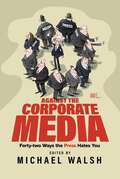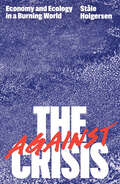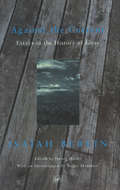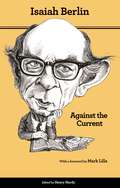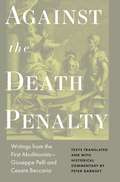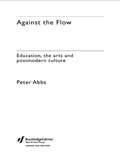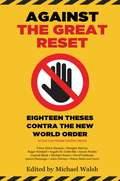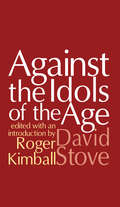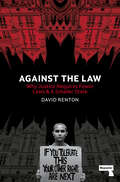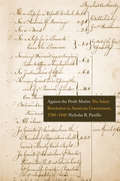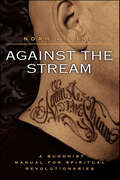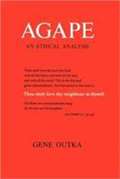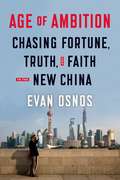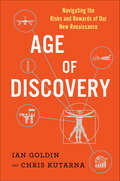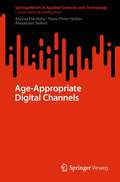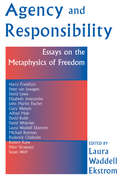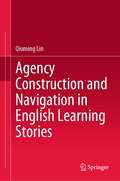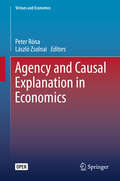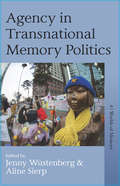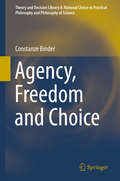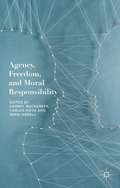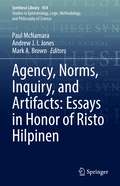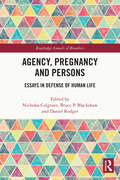- Table View
- List View
Against the Corporate Media: Forty-two Ways the Press Hates You
by the-Pipeline.orgThe citizens of Western democracies have been relentlessly propagandized, lied to, and fed a steady diet of distortions and untruths by their media for decades. Editor Michael Walsh brings together a stellar collection of critical thinkers and writers to explain how and why this is happening, its negative effects on our democracies, and what we can do to reverse it.An informed electorate is a prerequisite for free and fair elections. But rather than striving for accuracy and objectivity, today&’s journalists openly celebrate the death of objectivity, arguing that they have a &“higher duty&” to reject the conservatism, police speech, and suppress news that contradicts the liberal narrative. Now, on the heels of his magisterial volume Against the Great Reset, editor Michael Walsh presents Against the Corporate Media, a collection of more than forty essays on the decline and fall of the American and international news media. The book&’s list of distinguished contributors includes Lance Morrow, Andrew Klavan, John O&’Sullivan, Elizabeth Nickson, Monica Crowley, Charlie Kirk, Glenn Reynolds, Steven F. Hayward, John Fund, Armond White, Michael Ramirez, Walsh, and others. Readers around the world deserve to know how badly their media has been corrupted, how eagerly they have embraced the role of official propagandists, and what a threat to democracy they have become. This book marks an important strike against the corporate media, and its unholy alliance with the enemies of freedom everywhere.
Against the Crisis: Economy and Ecology in a Burning World
by Ståle HolgersenCapitalism produces crises and crises reproduce capitalism. We need an ecosocialist way outIf crisis defines our era, we need a coherent socialist policy in response. Ståle Holgersen delves into today&’s economic and ecological crises to demonstrate that they are not exceptions to an otherwise functioning system but integral to its operation. It is naive to see these upheavals as opportunities for reform or revolution. They are the bedrock of the status quo. Fortunately, the vicious circle sustaining capitalism is not founded on an iron law. Our historical mission in the face of the climate crisis is to create a historical exception to the rule. It is time for ecosocialism against crisis.
Against the Current: Essays in the History of Ideas
by Isaiah BerlinBerlin's main theme in these essays is the importance in the history of ideas of dissenters whose thinking still challenges conventional wisdom - among them Machiavelli, Vico, Montesquieu, Herzen and Sorel. With his unusual powers of imaginative re-creation, he brings to life original minds that swam against the current of their times, and in the process offers a powerful defence of variety in our visions of life. Roger Hausheer's introduction surveys Berlin's whole oeuvre, and the full bibliography of his pubication has been updated for this Pimlico edition.
Against the Current: Essays in the History of Ideas - Second Edition
by Isaiah BerlinIn this outstanding collection of essays, Isaiah Berlin, one of the great thinkers of the twentieth century, discusses the importance of dissenters in the history of ideas--among them Machiavelli, Vico, Montesquieu, Herzen, and Sorel. With his unusual powers of imaginative re-creation, Berlin brings to life original minds that swam against the current of their times--and still challenge conventional wisdom. In a new foreword to this corrected edition, which also includes a new appendix of letters in which Berlin discusses and further illuminates some of its topics, noted essayist Mark Lilla argues that Berlin's decision to give up a philosophy fellowship and become a historian of ideas represented not an abandonment of philosophy but a decision to do philosophy by other, perhaps better, means. "His instinct told him," Lilla writes, "that you learn more about an idea as an idea when you know something about its genesis and understand why certain people found it compelling and were spurred to action by it." This collection of fascinating intellectual portraits is a rich demonstration of that belief.
Against the Death Penalty: Writings from the First Abolitionists—Giuseppe Pelli and Cesare Beccaria
by Cesare Beccaria Giuseppie PelliThe first known abolitionist critique of the death penalty—here for the first time in EnglishIn 1764, a Milanese aristocrat named Cesare Beccaria created a sensation when he published On Crimes and Punishments. At its centre is a rejection of the death penalty as excessive, unnecessary, and pointless. Beccaria is deservedly regarded as the founding father of modern criminal-law reform, yet he was not the first to argue for the abolition of the death penalty. Against the Death Penalty presents the first English translation of the Florentine aristocrat Giuseppe Pelli's critique of capital punishment, written three years before Beccaria's treatise, but lost for more than two centuries in the Pelli family archives.Peter Garnsey examines the contrasting arguments of the two abolitionists, who drew from different intellectual traditions. Pelli was a devout Catholic influenced by the writings of natural jurists such as Hugo Grotius, whereas Beccaria was inspired by the French Enlightenment philosophers. While Beccaria attacked the criminal justice system as a whole, Pelli focused on the death penalty, composing a critique of considerable depth and sophistication. Garnsey explores how Beccaria's alternative penalty of forced labour, and its conceptualisation as servitude, were embraced in Britain and America, and delves into Pelli's voluminous diaries, shedding light on Pelli's intellectual development and painting a vivid portrait of an Enlightenment man of letters and of conscience.With translations of letters exchanged by the two abolitionists and selections from Beccaria's writings, Against the Death Penalty provides new insights into eighteenth-century debates about capital punishment and offers vital historical perspectives on one of the most pressing questions of our own time.
Against the Flow: Education, the Art and Postmodern Culture
by Peter AbbsAt once provocative and inspiring, Against the Flow is a work of polemic from an internationally respected writer and thinker on arts education. Peter Abbs argues that contemporary education ignores the aesthetic and ethical as a result of being in thrall to such forces as the market economy and managerial and functional dictates. He identifies the present education system as being inimical to creativity and authentic learning and instead, narrowly focused on the quantitative measuring of results. This absence of a creative and ethical dimension in education has implications for art making in wider society. Art is shown as emerging from, and appealing to, the ironic postmodernist sensibility and mass media-led culture, while being devoid of philosophical significance.This book opens up a fresh and timely debate about the vital power of creativity in modern education. Drawing on examples from modern poetry, literature and visual art, it is an eloquent and passionate argument for the need to develop ethical and aesthetic energies to confront the growing vacuity of contemporary culture.
Against the Great Reset: Eighteen Theses Contra the New World Order
by the-Pipeline.orgMuch more than a collection of essays by eminent writers, Against the Great Reset is intended to kick off the intellectual resistance to the sweeping restructuring of the western world by globalist elites.In June 2020, prominent business and political leaders gathered for the 50th annual meeting of the World Economic Forum in Davos, Switzerland, under the rubric of &“The Great Reset.&” In the words of WEF founder Klaus Schwab, the Great Reset is a &“unique window of opportunity&” afforded by the worldwide COVID-19 panic to build &“a new social contract&” ushering in a utopian era of economic, social, and environmental justice. But beneath their lofty and inspiring words, what are their actual plans? In this timely and necessary book, Michael Walsh has gathered trenchant critical perspectives on the Great Reset from eighteen eminent writers and journalists from around the world. Victor Davis Hanson places the WEF&’s prescriptions and goals in historical context and shows how American politicians justify destructive policies. Michael Anton explains the socialist history of woke capitalism. James Poulos looks at how Big Tech acts as informal government censors. John Tierney lays out the lack of accountability for the unjustified panic over the virus. David Goldman confronts the WEF&’s ideas for a fourth industrial revolution with China&’s commitment to being the leader of a post-western world. And there are many more. These writers see the goal of the Great Reset as not just a world without racism, disease, economic inequality, or fossil fuels—but rather, a world with no individual autonomy and power in which our betters rig the system for their own purposes. Find out what the Great Resetters ultimately have in store for you, and join the intellectual resistance—before it&’s too late. Featuring Essays by: Michael Anton Salvatore Babones Conrad Black Jeremy Black Angelo Codevilla Janice Fiamengo Richard Fernandez David P. Goldman Victor Davis Hanson Martin Hutchinson Roger Kimball Alberto Mingardi Douglas Murray James Poulos Harry Stein John Tierney Michael Walsh
Against the Idols of the Age
by David StoveLittle known outside his native Australia, David Stove was one of the most illuminating and brilliant philo-sophical essayists of the postwar era. A fearless at-tacker of intellectual and cultural orthodoxies, Stove left powerful critiques of scientific irrationalism, Dar-winian theories of human behavior, and philosophi-cal idealism. He was also an occasional essayist of considerable charm and polemical snap. Stove's writ-ing is both rigorous and immensely readable. It is, in the words of Roger Kimball, "an invigorating blend of analytic lucidity, mordant humor, and an amount of common sense too great to be called 'common.'" Against the Idols of the Age brings together a repre-sentative selection of Stove's writing and is an ideal introduction to his work.The book opens with some of Stove's most impor-tant attacks on irrationalism in the philosophy of sci-ence. He exposes the roots of this fashionable attitude, tracing it through writers like Paul Feyerabend andThomas Kuhn to Karl Popper. Stove was a born controversialist, so it is not surpris-ing that when he turned his attention to contemporary affairs he said things that are politically incorrect. The topical essays that make up the second part of the book show Stove at his most withering and combative. Whether the subject is race, femi-nism, the Enlightenment, or the demand for "non-coercive philosophy," Stove is on the mark with a battery of impressive arguments expressed in sharp, uncompromis-ing prose. Against the Idols of the Age concludes with a generous sampling of his blistering attacks on Darwinism.David Stove's writings are an undiscovered treasure. Although readers may dis-agree with some of his opinions, they will find it difficult to dismiss his razor-sharp arguments. Against the Idols of the Age is the first book to make the full range of this important thinker available to the general reader.
Against the Law: Why Justice Requires Fewer Laws and a Smaller State
by David RentonOne of Britain&’s leading barristers argues for a world in which the law should play a smaller part in all our lives.Understanding the main political projects of our times, and their plans to expand or shrink the law, is the first step towards achieving greater equality and averting climate disaster.Since 2016, Britain has been ruled by populists, who promise to expand democracy and shrink the law by taking back power from the European Union. Yet what these populists have actually done in power is institute a vast increase in new laws, made by ministers and not Parliament, regulating every aspect of our lives.This move of promising less law while actually expanding it, has been characteristic of our lives for forty years, ever since the neoliberal counter-revolution. Every year, new criminal offences are created; new regulations are introduced. Renton&’s book dares us to imagine a world in which workers are winning, and ecocide treated with the urgency that it deserves. These changes can only come about, he argues, if the movements of the oppressed choose to disengage from the law.
Against the Profit Motive
by Nicholas R. ParrilloIn America today, a public official’s lawful income consists of a salary. But until a century ago, the law frequently provided for officials to make money on a profit-seeking basis. Prosecutors won a fee for each defendant convicted. Tax collectors received a percentage of each evasion uncovered. Naval officers took a reward for each ship sunk. Numerous other officers were likewise paid for #147;performance. ” This book is the first to document the American government’s for-profit past, to discover how profit-seeking defined officialdom’s relationship to the citizenry, and to explain how lawmakers#151;by ultimately banishing the profit motive in favor of the salary#151;transformed that relationship forever.
Against the Stream: A Buddhist Manual for Spiritual Revolutionaries
by Noah LevineBuddha was a revolutionary. His practice was subversive; his message, seditious. His enlightened point of view went against the norms of his day—in his words, "against the stream." His teachings changed the world, and now they can change you too.Presenting the basics of Buddhism with personal anecdotes, exercises, and guided meditations, bestselling author Noah Levine guides the reader along a spiritual path that has led to freedom from suffering and has saved lives for 2,500 years. Levine should know. Buddhist meditation saved him from a life of addiction and crime. He went on to counsel and teach countless others the Buddhist way to freedom, and here he shares those life-changing lessons with you. Read and awaken to a new and better life.
Agape: An Ethical Analysis
by Gene OutkaA professor of religion considers the various ethical problems raised by the idea of unconditional love.
Age of Ambition: Chasing Fortune, Truth, and Faith in the New China
by Evan OsnosWinner of the 2014 National Book Award in nonfiction. An Economist Best Book of 2014. A vibrant, colorful, and revelatory inner history of China during a moment of profound transformation From abroad, we often see China as a caricature: a nation of pragmatic plutocrats and ruthlessly dedicated students destined to rule the global economy-or an addled Goliath, riddled with corruption and on the edge of stagnation. What we don't see is how both powerful and ordinary people are remaking their lives as their country dramatically changes  As the Beijing correspondent for The New Yorker, Evan Osnos was on the ground in China for years, witness to profound political, economic, and cultural upheaval. In Age of Ambition, he describes the greatest collision taking place in that country: the clash between the rise of the individual and the Communist Party's struggle to retain control. He asks probing questions: Why does a government with more success lifting people from poverty than any civilization in history choose to put strict restraints on freedom of expression? Why do millions of young Chinese professionals-fluent in English and devoted to Western pop culture-consider themselves "angry youth," dedicated to resisting the West's influence? How are Chinese from all strata finding meaning after two decades of the relentless pursuit of wealth? Writing with great narrative verve and a keen sense of irony, Osnos follows the moving stories of everyday people and reveals life in the new China to be a battleground between aspiration and authoritarianism, in which only one can prevail.
Age of Discovery: Navigating the Risks and Rewards of Our New Renaissance
by Ian Goldin Chris KutarnaThe present is a contest between the bright and dark sides of discovery. To avoid being torn apart by its stresses, we need to recognize the fact—and gain courage and wisdom from the past. Age of Discovery shows how.Now is the best moment in history to be alive, but we have never felt more anxious or divided. Human health, aggregate wealth and education are flourishing. Scientific discovery is racing forward. But the same global flows of trade, capital, people and ideas that make gains possible for some people deliver big losses to others—and make us all more vulnerable to one another. Business and science are working giant revolutions upon our societies, but our politics and institutions evolve at a much slower pace. That’s why, in a moment when everyone ought to be celebrating giant global gains, many of us are righteously angry at being left out and stressed about where we’re headed.To make sense of present shocks, we need to step back and recognize: we’ve been here before. The first Renaissance, the time of Columbus, Copernicus, Gutenberg and others, likewise redrew all maps of the world, democratized communication and sparked a flourishing of creative achievement. But their world also grappled with the same dark side of rapid change: social division, political extremism, insecurity, pandemics and other unintended consequences of discovery.Now is the second Renaissance. We can still flourish—if we learn from the first.
Age-Appropriate Digital Channels (SpringerBriefs in Applied Sciences and Technology)
by Alexander Seifert Alireza Darvishy Hans-Peter HutterAs a client or a developer, what do you need to consider when developing an age-appropriate website or mobile application? This book explains how age-related limitations affect the use of websites and mobile applications. If gerontological aspects are not taken into account in the design of digital channels, older people tend to do without them. Therefore, websites and mobile applications need to take into account the needs of older people. In the book, you will find useful recommendations on how to do this so that your websites and mobile apps are easy to use for everyone.
Ageing in a Nursing Home: Foundations for Care
by Rosalie HudsonSpending the final chapter of your life in a nursing home is considered, by many, a fate worse than death. Others, however, have found that through enlightened, imaginative care even the frailest of lives can flourish. The key to such a transformation is to replace the constricting custodial centres of the past with a more informed, research-based approach. This book is timely, responding to evidence of the urgent need for change described in the Australian Royal Commission into Aged Care Quality and Safety Final Report: Care, Dignity and Respect and its predecessor subtitled Neglect. In this book, the author proposes a model of care that places the whole person at its centre, sidestepping the constraints of a reductionist funding model that focusses on residents' deficits – and the proprietor’s financial gain. Aged care requires a comprehensive research-based guide to fulfil this aim. Narratives are included throughout the book to reinforce the fact that nursing home care is about individual residents and their unique lives. Topics explored in various chapters include:· Ageing in a Changing Community· Social, Gerontological Care· A Palliative Approach· Community Expectations Ageing in a Nursing Home: Foundations for Care takes a realistic approach that draws on contemporary research and narratives from the unique lives of older Australians who, despite their frailty, teach us how to care. Such knowledge informs and influences their future. The book is a resource intended for all who have a stake in the provision of best practice residential aged care, and all who benefit from such care. Its academic appeal will include those who design and teach courses in aged care: gerontology, general practice medicine, nursing, attendant care, allied health, and chaplaincy. Academics and teachers will find useful, well-referenced material for their courses, together with ample scope for researchers.
Agency And Responsiblity: Essays On The Metaphysics Of Freedom
by Laura EkstromA companion volume to Free Will: A Philosophical Study, this new anthology collects influential essays on free will, including both well-known contemporary classics and exciting recent work. Agency and Responsibility: Essays on the Metaphysics of Freedom is divided into three parts. The essays in the first section address metaphysical issues concerning free will and causal determinism. The second section groups papers presenting a positive account of the nature of free action, including competing compatibilist and incompatibilist analyses. The third section concerns free will and moral responsibility, including theories of moral responsibility and the challenge to an alternative possibilities condition posed by Frankurt-type scenarios. Distinguished by its balance and consistently high quality, the volume presents papers selected for their significance, innovation, and clarity of expression. Contributors include Harry Frankfurt, Peter van Inwagen, David Lewis, Elizabeth Anscombe, John Martin Fischer, Michael Bratman, Roderick Chisholm, Robert Kane, Peter Strawson, and Susan Wolf. The anthology serves as an up-to-date resource for scholars as well as a useful text for courses in ethics, philosophy of religion, or metaphysics. In addition, paired with Free Will: A Philosophical Study, it would form an excellent upper-level undergraduate or graduate-level course in free will, responsibility, motivation, or action theory.
Agency Construction and Navigation in English Learning Stories
by Qiuming LinThis book presents a longitudinal research which covers a linguistic approach to understand and observe language learner agency. It makes connections between agency in discourse analyses and agency in applied linguistics by examining how learner agency is manifested in autobiographic oral narratives and influenced by contextual factors. This book also demonstrates that agency is not a fixed entity that English learners possess, but a dynamic construct constantly negotiated by the learners with the social world. It is the result of their identity positioning and repositioning within a complex and ever-changing context. Learner identities, either actual or imagined, are significantly correlated with their investment in English and their English learning process.This book sheds new light on teaching English as a foreign language and gives inspirations for enhancing English learners’ agency in contemporary context of China. As learner agency should be treated in a dynamic and process view, a low level of agency manifested in a particular period or in a certain context may not necessarily persist in later periods or extend to other contexts. Provided with supportive contextual conditions and taking on positive and powerful identities, language learners are well on the course for higher levels of agency.
Agency and Causal Explanation in Economics (Virtues and Economics #5)
by László Zsolnai Peter RónaThis open access book provides an exploration of the consequences of the ontological differences between natural and social objects (sometimes described as objects of nature and objects of thought) in the workings of causal and agency relationships. One of its important and possibly original conclusions is that causal and agency relationships do not encompass all of the dependent relationships encountered in social life. The idea that social reality is contingent has been known (and largely undisputed) at least since Wittgenstein’s “On Certainty”, but social science, and most notably economics has continued to operate on the basis of causal and agency theories borrowed or adapted from the natural sciences. This volume contains essays that retain and justify the partial or qualified use of this approach and essays that totally reject any use of causal and agency theory built on determined facts (closed systems).The rejection is based on the possibly original claim that, whereas causation in the objects of the natural sciences reside in their properties, human action is a matter of intentionality. It engages with critical realist theory and re-examines the role of free will in theories of human action in general and economic theory in particular.
Agency in Transnational Memory Politics (Worlds of Memory #4)
by Jenny Wüstenberg and Aline SierpThe dynamics of transnational memory play a central role in modern politics, from postsocialist efforts at transitional justice to the global legacies of colonialism. Yet, the relatively young subfield of transnational memory studies remains underdeveloped and fractured across numerous disciplines, even as nascent, boundary-crossing theories on topics such as multi-vocal, traveling, or entangled remembrance suggest new ways of negotiating difficult political questions. This volume brings together theoretical and practical considerations to provide transnational memory scholars with an interdisciplinary investigation into agency—the “who” and the “how” of cross-border commemoration that motivates activists and fascinates observers.
Agency in Transnational Memory Politics (Worlds of Memory #4)
by Jenny Wüstenberg and Aline SierpThe dynamics of transnational memory play a central role in modern politics, from postsocialist efforts at transitional justice to the global legacies of colonialism. Yet, the relatively young subfield of transnational memory studies remains underdeveloped and fractured across numerous disciplines, even as nascent, boundary-crossing theories on topics such as multi-vocal, traveling, or entangled remembrance suggest new ways of negotiating difficult political questions. This volume brings together theoretical and practical considerations to provide transnational memory scholars with an interdisciplinary investigation into agency—the “who” and the “how” of cross-border commemoration that motivates activists and fascinates observers.
Agency, Freedom and Choice (Theory and Decision Library A: #53)
by Constanze BinderIn this book, Binder shows that at the heart of the most prominent arguments in favour of value-neutral approaches to overall freedom lies the value freedom has for human agency and development. Far from leading to the adoption of a value-neutral approach, however, ascribing importance to freedom’s agency value requires one to adopt a refined value-based approach. Binder employs an axiomatic framework in order to develop such an approach. She shows that a focus on freedom’s agency value has far reaching consequences for existing results in the freedom ranking literature: it requires one to move beyond a person’s given all-things-considered preferences to the values underlying a person’s preference formation. Furthermore, it requires, as Binder argues, one to account (only) for those differences between choice options which really matter to people. Binder illustrates the implications of her analysis for the evaluation of public policy and human development with the capability approach: only if sufficient importance is ascribed to freedom’s agency value can the capability approach keep its promises.
Agency, Freedom, and Moral Responsibility
by Andrei Buckareff Carlos Moya Sergi RosellIn recent years there has been a resurgence of interest in problems related to human agency and responsibility by philosophers and researchers in cognate disciplines. The present volume brings together original contributions by leading specialists working in this vital field of philosophical inquiry. The contents represent the state of the art of philosophical research on intentional agency, free will, and moral responsibility. The volume begins with chapters on the metaphysics of agency and moves to chapters examining various problems of luck. The final two sections have a normative focus, with the first of the two containing chapters examining issues related to responsible agency and blame and the chapters in the final section examine responsibility and relationships. This book will be of interest to researchers and students interested in both metaphysical and normative issues related to human agency.
Agency, Norms, Inquiry, and Artifacts: Essays in Honor of Risto Hilpinen (Synthese Library #454)
by Mark A. Brown Paul McNamara Andrew J. I. JonesThe book contains a collection of chapters written by experts from the fields of philosophy, law, logic, computer science and artificial intelligence who pay tribute to Professor Risto Hilpinen's impressive work on the logic of induction, on deontic logic and epistemology, and on philosophy of science.In addition to an introduction by the editors, a section on Professor Hilpinen’s positions, professional services and honors, as well as a complete bibliography of his writings, the editors, McNamara, Jones and Brown, have compiled a multidisciplinary global cross-section of academic contemporaries that provides insights and perspectives on Hilpinen's influence and legacy.The essays reflect central aspects of Risto Hilpinen's research interests, and offer further contributions to some of the philosophical fields for which he is best known: applied modal logic, including deontic logic (from the ancient Greek δέον déon, pertaining to the concepts of duty and obligation), the semantics of normative language, the logic of action, and the theory of practical reasoning; the analysis of the concept of artifact; and the theory of semiotics in the tradition of Charles Peirce. The presence in the collection of several papers relating to deontic logic underlines Hilpinen's importance in that area, in which his publications have long been recognized as standard works. The book is an essential collection of ideas for all those who feel at home in a variety of formal disciplines, from propositional logic to the logic of artificial intelligence.
Agency, Pregnancy and Persons: Essays in Defense of Human Life (Routledge Annals of Bioethics)
by Nicholas Colgrove Bruce P. Blackshaw Daniel RodgerThis book provides extensive and critical engagement with some of the most recent and compelling arguments favoring abortion choice. It features original essays from leading and emerging philosophers, bioethicists and medical professionals that present philosophically sophisticated and novel arguments against abortion choice. The chapters in this book are divided into three thematic sections. The first set of essays focuses primarily on unborn human individuals—zygotes, embryos and fetuses. In these chapters it is argued, for example, that human organisms begin to exist at conception and that zygotes, embryos and fetuses are persons. These chapters also explore questions about whether or not zygotes, embryos and fetuses are part of their mothers’ bodies. The second set of essays focuses primarily on elective abortion and the debates surrounding it. These chapters consider whether or not opponents of abortion are commonly hypocritical, how opponents of abortion should think about adoption, how emerging technologies may affect the current debate and whether or not those participating in the debate should rely on analogies to support their case. Finally, the third set of essays shifts focus from the legal and moral status of elective abortion to its place in medical practice. In these chapters it is argued that elective abortion embodies a kind of ableism, and that elective abortion is medically unnecessary, harmful to women’s mental health and that telemedicine abortion poses significant risks to women’s health. Agency, Pregnancy and Persons offers an up-to-date examination of unborn human beings, the debates surrounding elective abortion and the place of elective abortion within medical practice. It will be of interest to medical professionals and those who work in philosophy, bioethics and medical ethics alike.
